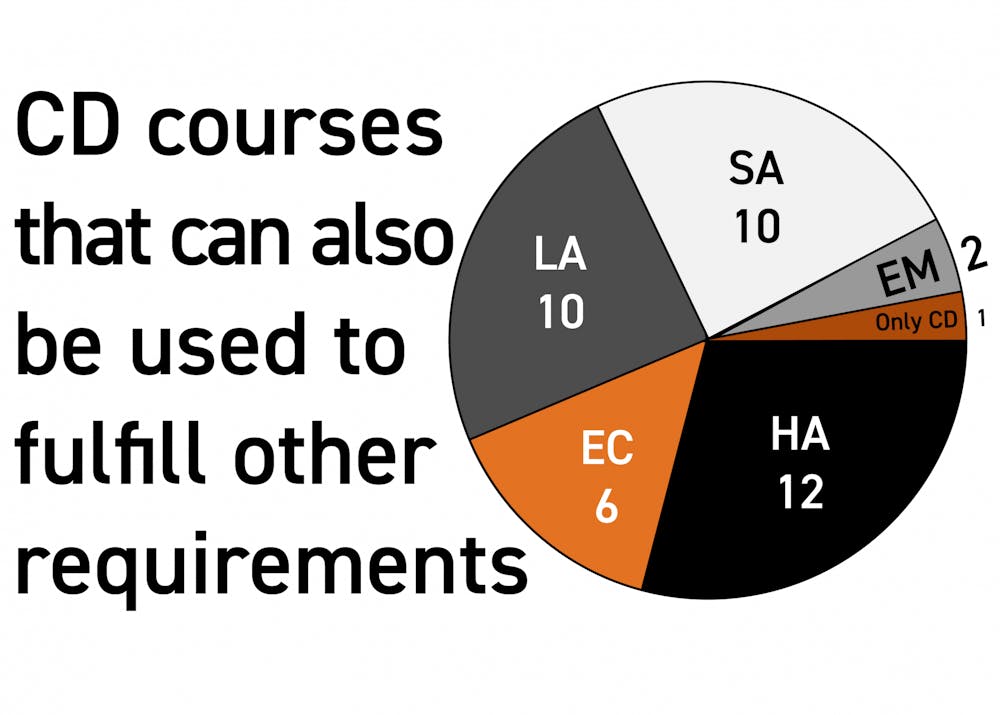Among the 1,232 courses currently offered for Fall 2020, 41 will count towards the new “Culture and Difference” (CD) distribution requirement announced last spring.
The new requirement, which will go into effect for the Class for 2024, aims to expose students to a variety of cultures and experiences and allow them to explore these cultural practices across a wide range of disciplines. A.B. students will be able to satisfy this requirement either alone or concurrently with another distribution area, while B.S.E. students will have the option to take a CD course to fulfill one of their seven required Humanities and Social Science courses.
“Making this a formal requirement ensures that all A.B. students encounter the cultural analysis of difference as they satisfy their general education requirements, an essential disciplinary approach that had not previously been reflected in our requirements,” wrote Deputy University Spokesperson Michael Hotchkiss in an email to The Daily Princetonian.
The CD distribution area was approved by faculty in spring 2019, among other changes to the distribution requirements. These included refinements to the distribution requirement descriptions and name changes: requirements previously known as “Science and Technology with/without Laboratory” (STL/STN) and “Quantitative Reasoning” (QR) have been renamed to “Science and Engineering with/without Laboratory” (SEL/SEN) and “Quantitative and Computational Reasoning” (QCR), respectively.
Additionally, this will be the first time that courses are cross-listed among multiple distribution areas. For instance, a class might be listed under both Literature and the Arts (LA) and Social Analysis (SA), allowing a student to select the requirement that they would prefer to fulfill.
The newly-introduced Culture and Difference distribution area will be the only such distribution that can be taken simultaneously with another requirement.
“Because the analysis of culture and difference transcends any single disciplinary approach, A.B. students are permitted to satisfy this requirement simultaneously with another distribution area,” Hotchkiss told the ‘Prince.’
Among the 41 courses currently classified as CD, all but one are cross-listed with another distribution area.

Nearly one-third of these are listed as Historical Analysis (HA), followed by ten each under LA and SA. Six are counted as Epistemology and Cognition (EC) and two as Ethical Thought and Moral Values (EM), leaving just one course that is considered only CD.
The course, POL 420: Reading Immigrant Narratives — U.S. Immigration and Integration, is a seminar-style course that, according to its course description, “draws on the use of immigrant narratives as a lens through which to understand both the history of immigration in the U.S. and the contemporary immigration landscape.”
“We look to faculty members to propose distribution areas, and for that course CD was one that [the] faculty/department proposed,” Hotchkiss wrote.
The CD classes are also distributed among various departments. Six of the 41 courses have the primary departmental listing of African American Studies (AAS), and an additional six under Anthropology (ANT). Four each are offered by the Comparative Literature (COM) department and the Spanish (SPA) program.

The remainder are scattered across other fields: American Studies, Art and Archeology, Asian American Studies, Dance, East Asian Studies, English, French, History, Humanistic Studies, Latin American Studies, Linguistics, Music Theater, Near Eastern Studies, and Politics.

Mark Dodici / The Daily Princetonian
Professor Steven Kelts, who will teach POL 311: Multiculturalism — Conflicts Over Diversity in the Modern State this fall, spoke enthusiastically about the new requirement in an interview with the ‘Prince.’
“In some sense, I think Politics classes have always been about difference,” Kelts said. “Maybe not always about cultural difference, but about how people negotiate their strong differences in the public sphere.”
“I think it’s an important offering for folks to look specifically at how cultural difference can present difficult political problems, but also present us with opportunities for new ways of living together,” he added.
Kelts explained that faculty members applying for the opportunity to have their classes meet the CD requirement need to show how “at least 50 percent of [the course content] had to do with cultural difference.”
In his course, issues of culture and difference will be examined through discussion of the meaning of culture, cultural accommodation, and historical public policy issues and Supreme Court cases that have dealt with culture and difference.
“It’s absolutely going to change the way that I approach the course,” Kelts said. “On my syllabus, I have reached for probably twenty percent [of] topics that are new to me, trying to think about what Princeton students need to know about accommodating culture and difference… What do they need to know for their world?”
Professor Jennifer A. Widner, who will teach POL 366 / AFS 366: Politics in Africa, told the ‘Prince’ that she has also adapted her course to better fit the new distribution area.
“I am happy to hear that the course now carries that designation,” she wrote in an email. “This course has always approached its subject matter from a variety of perspectives… Partly because the course needed updating anyway, and partly because it was a plausible candidate to meet the new requirement, I have adapted a bit. That has meant condensing some subject matter, unfortunately, but we can now take on some new policy challenges. I have varied the assignment options, too, and these allow people to explore some of the dimensions that interest them most.”
Though each Culture and Difference course will take on a different facet of the subject matter, they share an emphasis on the importance of cultural study.
“I’ve worked on this issue for twenty years,” Kelts said, “and I do really believe that there’s a significant benefit to students of contemplating what cultural accommodation really means.”








